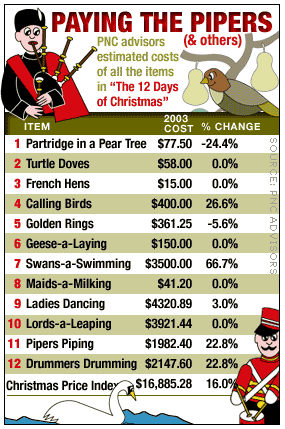NEW YORK (CNN/Money) - A partridge in a pear tree and five golden rings may be a bargain this year, but the price for seven swans a-swimming has gone through the roof, driving up the cost of the 12 days of Christmas by a record amount, according to an estimated cost of the holiday carol's shopping list.

PNC Advisors has done an estimated Christmas Price Index each year since 1984. This year's index put the cost of all 364 items mentioned in the song, along with all the repetitions, at $65,264, up 19 percent from a year earlier, the largest increase since the tongue-in-cheek index began.
The financial service advisers' straight index, which eliminates the repetition, is up 16 percent, to $16,885.28.
The seven swans a-swimming is the most expensive jump, up by two thirds to $3,500 this year. Jeff Kleintop, chief investment strategist for PNC Advisors, said the big jump in the estimated cost this year, provided by the Philadelphia Zoo, is due to "the vagaries of the swan breeding cycles. It's a three-year cycle."
PNC said the "core" index, which excludes the price of the swans, increased only 7.4 percent this year. "If the feds can exclude food and energy, we figured we could exclude swans," Kleintop said, referring to the government's so-called core measures of inflation.
There were mixed results for the other fowl on the index. The four calling birds posted the second-biggest percentage increase -- up 26.6 percent to $400 -- but the prices of two turtle doves, three French hens and six geese a-laying all were unchanged from a year earlier.
"The bird prices tend to be stable, except when supply and demand get out of synch, causing the prices to move dramatically," said Rebekah McCahan, a PNC investment strategist who provides research for the index.
The cost of the partridge in the pear tree fell 28.6 percent to $62.50, as the price of the partridge itself stayed unchanged while the cost of the pear tree came down. Five golden rings cost 5.6 percent less, or $361.25. Kleintop said that is based on retail prices for plain gold bands, which were lower despite an increase in the price of gold during the course of the year.
"The index reflects the broader trend of productivity growth in the U.S. economy that has driven prices lower on goods while allowing prices for services to rise modestly," Kleintop said.
The 11 pipers piping and 12 drummers drumming both posted 22.8 percent increases. But the other labor-intensive presents saw little or no increase; the price of nine ladies dancing was up 3 percent, while eight maids a-milking and 10 lords a-leaping both were unchanged from a year ago.
"The abundance of cheap labor in countries such as China has contributed toward increased pressure on U.S. manufacturers to outsource their unskilled labor overseas, and evolve toward higher skilled areas, to maintain profitability," Kleintop said. "Unfortunately, the unskilled maids haven't managed an increase in price for their services in many years."
Kleintop said that with mechanized milking machine, there really isn't much in the way of people who work milking. The cost of eight maids a-milking -- the second cheapest item on the list after three French hens -- was based on minimum wage for one hour. He said the musicians could command higher pay because, being unionized, they were able to pass on increased pension and insurance costs to those hiring them.
If consumers buy the goods on the Internet, they will see a smaller percentage increase, only 2.1 percent for the index. In fact, the price of the swans didn't increase when purchased online.
"Here in Philadelphia, the zoo is pretty much the market maker in prices for swans," he said. "There's more stability in pricing when you use a medium that can access many different sources."
But shipping costs makes buying online more expensive -- $25,109.27 for the overall index, or $101,206.09 when adjusted for all the repetitions involved in the song.

|

